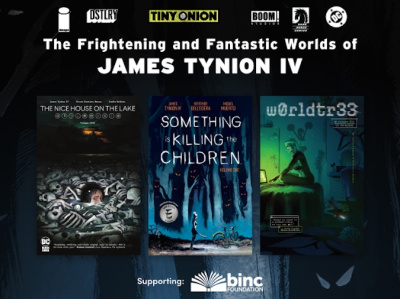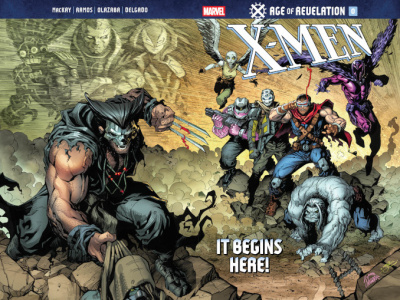Allen N. Swords, an English lecturer at Clemson University Department of English in Clemson, South Carolina saw Steve Bennett's column on the contents of comics and the relationship with sales, and decided he 'wanted to spend a few moments taking umbrage to the recent column from Steve Bennett' (see 'Confessions of a Comic Book Guy--Giving People What They Don't Want'):
Mr. Bennett reminds his audience that in last Sunday's New York Times there was a lengthy piece about Leslie Moonves, chairman of CBS Television and Viacom Corporation, which had a quote from him about why he ultimately decided to cancel the cult favorite program Joan of Arcadia:
'In the beginning, it [Joan of Arcadia] was a fresh idea and uplifting, and the plot lines were engaging,' Moonves said, sounding a little sad and frustrated, 'But the show got too dark. I understand why creative people like dark, but American audiences don't like dark. They like story. They do not respond to nervous breakdowns and unhappy episodes that lead nowhere. They like their characters to be part of the action. They like strength, not weakness, a chance to work out any dilemma. This is a country built on optimism.'
The article deals with comic sales and how people like 'Superhero fare' the best... a fair assumption (almost a given in the American direct market). As a 32-year-old English teacher, I still enjoy mainstream superhero comics in addition to lots of indy fair.
But many artists and creators (Frank Miller, Grant Morrison, Warren Ellis, Will Eisner, Craig Thompson, et. al) do write 'dark stories'--whether about icons such as Superman, Batman, or Spider-Man, or about their own preferred subject matter or original ideas. Despite such story variety and formats that exist currently (and writers like Ellis may claim that there isn't even a true modicum of direct market choices), too many people remain unwilling to 'find' or 'seek out' anything that doesn't conform to the model of which Mr. Bennett speaks. He further claims that the reasons that comics sales are down are because people want simpler, more heroic stories and not ambiguous or gray ones. Why should a burgeoning, vital, and originally innovative art form (like comics and / or graphic novels) have to cater to the 'lowest common denominator' mentality of 'simplicity over substance?' At what point does such a stance prove self-defeating?
If Moonves's (and by proxy, Bennett's) syllogism is true--Americans like optimism; art therefore must have optimism; else art must fail or not continue to exist or get created--does that make intellectually complex subjects, human conditions, and 'non-heroic' stories a colossal waste of our time as members of a dwindling comics fanbase? Surely not!
We must not resign ourselves to Moonves's limited point of view. Such an argument educates our citizens poorly. In extreme cases, it could preclude Americans from openly, intellectually, emotionally, and academically dealing with 'popular forms of entertainment' in any way beyond a surface or superficial level. What about coming to terms with and debating/learning about such items of historical importance as the Holocaust, WWII, the War on Terror, or the Great Depression? Comics is a vital medium, as are film and television. However, the leaders of said media appear patently condescending to segments of the population that don't crave formula with our fantasy or 'fun.'
If our TV shows (or our novels, films, songs, non-fiction, documentaries, poetry, our comics, our stories, the very narrative urges that drive our species and existence) only cater to such notions as those expressed by Moonves and others, doesn't that make thinking irrelevant when we interact with its various art forms?
Entertainment cannot conform strictly to Moonves's standards of 'what Americans want.' Human beings (and in many cases, heroes) do face dilemmas that don't have a resolution. This doesn't make our dealing with such situations any less relevant or meaningful. Resolution isn't always a necessary component of stories, is it? Why must all forms of popular art require tidy formulas and inert generalities? Why keep comics in such a limited province, when we could have it in the public sphere outside the local multiplexes--in schools, in libraries, in out of the way places?
The poet Rainer Maria Wilke writes: 'Live your questions now, and perhaps without even knowing it, you will live into some long, distant day of your answers.' Even then, what if the questions are more important than any pat answers we might develop? John Stuart Mill claims that knowledge has its own end. Couldn't such a notion persist in regards to popular art, too?
Bennett further dictates: 'As currently written and drawn, the super-hero comic book is just too overwhelmingly dark to appeal to them.'
Why this dictatorial stance that demands simplicity over substance? If the books don't appeal to a portion of the comics market, specifically because they are 'too dark,' is that not the fault of an un-educated mass of people who don't read well or can't get beyond their own prejudices? Optimism is fine (and necessary), but at what cost do we prostitute ourselves, the comics as a medium of literature and art, and our capacity as reasoned creatures in order to revert to an unnecessary, forced, perhaps dying model of simplicity and fun?
It is little wonder, then, that many of my students, more than a majority of my university colleagues, and a large amount Western populations view comics books as 'kid's stuff' rather than as one of the major literary developments of the 20th Century and the Western world. Why would they think anything else about comics, TV, or film when executives and columnists so callously borrow from the bromide.
The opinions expressed in this Talk Back article are solely those of the writer, and do not necessarily reflect the views of the editorial staff of ICv2.com.







